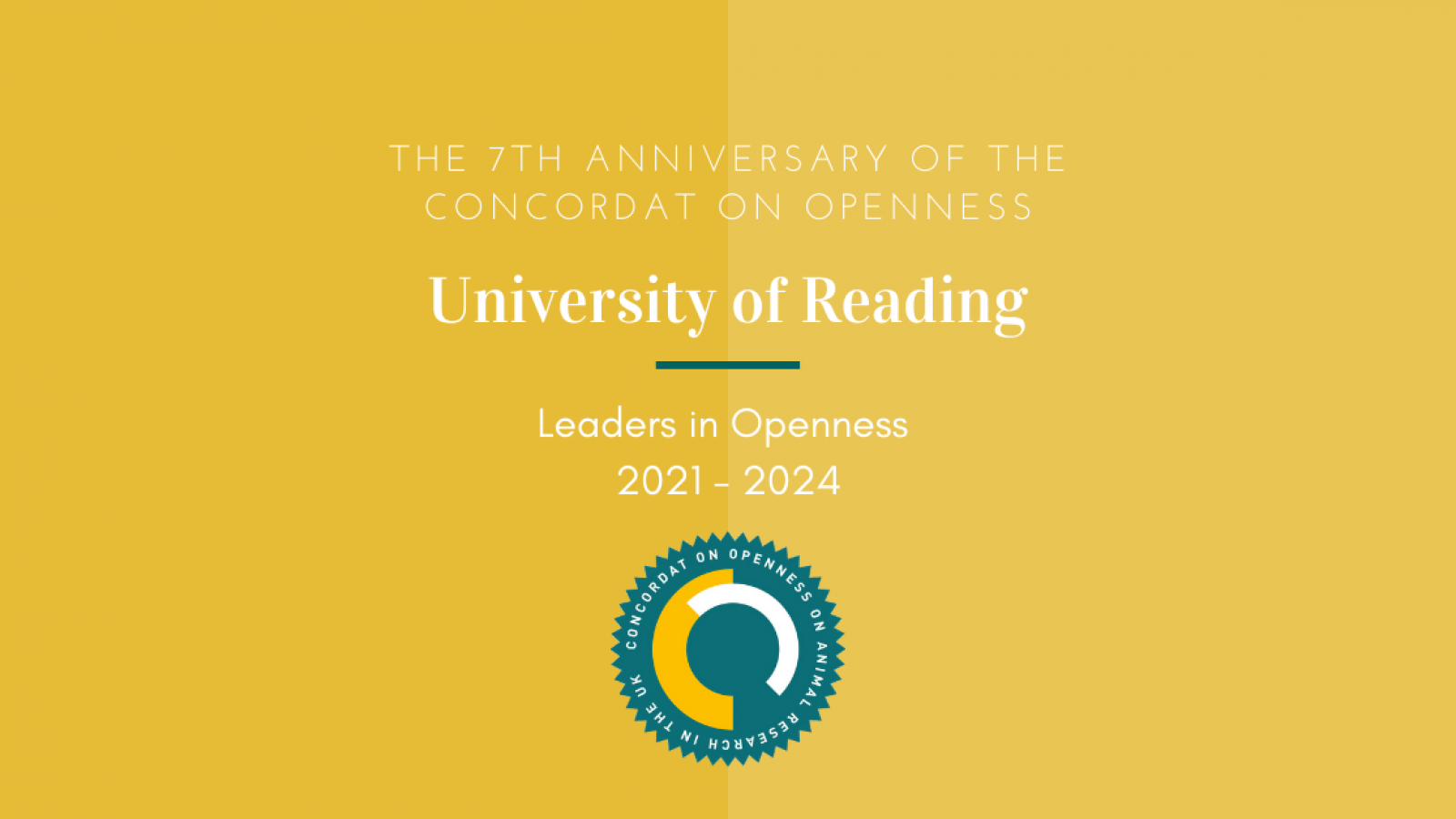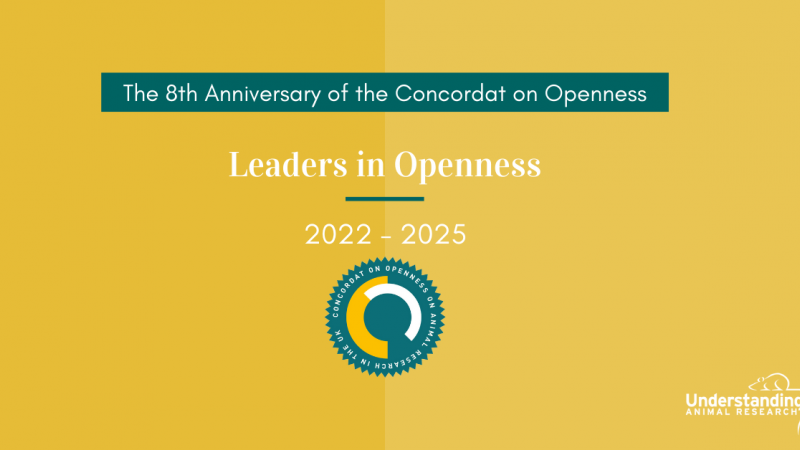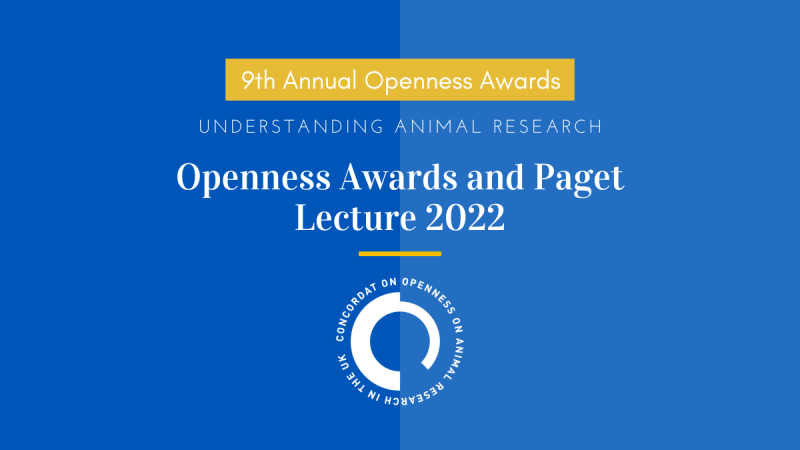Seven years of open animal research communications
Today (Friday 14 May), Understanding Animal Research (UAR), an organisation that promotes open communications about animal research, celebrates the seventh anniversary of the Concordat on Openness on Animal Research in the UK and announces that the University of Reading has achieved ‘Leaders in Openness’ status.
The Concordat on Openness, launched on 14 May 2014, commits its signatories to open, proactive communications around the use of animals in scientific, medical and veterinary research in the UK. The Concordat has been signed by 127 organisations including UK universities, pharmaceutical companies, medical research charities, research funders, learned societies and commercial research organisations.
Since the launch of the Concordat, signatories have taken significant steps to change the culture around communicating the use of animals in research and now more information than ever before can be found in the public domain. Signatories have produced public-facing websites with a wealth of information including virtual lab tours, they have developed internal communications strategies, worked with local and national press to share animal research stories, and created engaging activities so that the public can find out more.
In 2019 UAR launched Leaders in Openness status to recognise Concordat signatories that consistently achieve and embed good practice in their own animal research communications, taking significant and often risky steps to change the way that everyone thinks about animal research. These organisations are essential to moving the conversation around animal research forward and driving change in the sector. Through Leaders in Openness status, UAR hopes to share their practices more widely, supporting other organisations to take greater steps towards openness.
Today, UAR is delighted to announce that the University of Reading has become the latest Leader in Openness, joining the list of 14 previously successful applicants. The University of Reading submitted an excellent application outlining the many steps it has taken to engage proactively with the public, media, university staff, and students.
Reading's use of traditional and social media to convey its animal research projects is a leading example of openness. The university’s herd of llamas, which are used to produce antibodies for drug delivery research, have featured in social media campaigns to highlight the number of animals used in scientific research at Reading. The llamas have also been used in traditional media to convey Reading’s involvement in the global search to develop treatments and vaccines for Covid-19.
Animal research is heavily regulated in the UK, an experiment can only take place when a suitable animal-free method is not available, and it must be granted approval from the UK Home Office and a local ethical committee. All Concordat signatories are committed to the ‘3Rs’ of replacement, reduction and refinement. This means avoiding or replacing the use of animals where possible; minimising the number of animals used per experiment and optimising the experience of the animals to improve animal welfare.
Bella Williams, Head of Engagement at Understanding Animal Research, said:
“The Concordat on Openness on Animal Research in the UK is a voluntary code of practice that asks its 127 signatories to communicate openly about their use of animals in biomedical research. Since its launch, seven years ago today, we have seen a huge increase in the information about how, when and why animals are used in science that anyone can access through a web-search, attending an event or just through working at an organisation.
“The Concordat aims to remove the legacy of real and perceived secrecy around the use of animals in scientific research and create greater trust in the sector. Signatories are working with the media and public to explain how animal research has benefits for animals and humans, such as the development of new medicines like Covid-19 vaccines. They also show why animal research is vital to their organisation, and how those animals are cared for.
“Three years ago, we launched Leaders in Openness status to recognise signatories that consistently demonstrate best practice in their communications around animal research, leading the sector by example. Today I am delighted to announce that the University of Reading joins the list of Leaders in Openness. The university has shown tremendous leadership and innovation in communicating the essential animal research it carries out. In particular, the University of Reading’s handling of social media and willingness to engage in free debate around the validity of animal research makes this topic more accessible for their students, staff and the public.”
Professor Robert Van de Noort, Vice-Chancellor of the University of Reading, said:
“I am delighted that the University of Reading has become a Leader in Openness in animal research, recognising our commitment to not only doing highly important research using animals but also leading in best practice about how we talk about it. Our research is making a valuable difference in developing new treatments for dementia, heart disease and epilepsy and finding better ways to sustainably feed our world, and animals used in this research play an important role.”
-Ends-
Notes to Editors
For further information, please contact Hannah Hobson, Communications Manager at Understanding Animal Research.
T: 07759235176, E:hhobson@uar.org.uk
Further information on the Concordat on Openness on Animal Research in the UK can be found here: http://concordatopenness.org.uk
Concordat signatories need to apply for Leaders in Openness status, showing how they meet the criteria. Applications are assessed by a public panel, and by two peers from the life-sciences sector. Leaders in Openness status is given for three years after which organisations may re-apply.
A full list of Leaders in Openness can be found here:
https://concordatopenness.org.uk/leaders-in-openness
The Institute of Cancer Research
Last edited: 28 October 2022 15:07




